News
Iran: Now's The Time to Talk Nuclear Negotiations
Iran's not done sending mixed messages. Ahead of this month's six-day visit to New York, where the EU foreign policy chief Catherine Ashton will meet with Iran's foreign minister, President Rouhani has indicated that now is the time to act on nuclear negotiations — but added that his government won't give up "one iota" of its nuclear rights.
In an interview on Iranian state-run television Tuesday, Iranian President Hassan Rouhani seemed (at first) positive about restarting negotiations over the country's disputed nuclear program.
“The nuclear issue will be resolved soon if the other side is serious,” he said. “The final result should be a win-win. We are ready for it.”
His comments emphasized what the West has been thinking for a while: that Rouhani, who is relatively moderate, might push forward the nuclear talks, which have been stalling for years under the former President Mahmoud Ahmadinejad. Having reshuffled many of the officials dealing with the program — including appointing the foreign minister to represent Iran during negotiations, and appointing a new envoy to the IAEA, Reza Najafi — the hope remains that this time, a breakthrough might be achieved.
But the Iranian President pointed out that the opportunity has an expiry date.
"The world should know that the period for solving the nuclear case will not be unlimited [...] The world should take advantage of this period and the opportunity that our nation created by the election," he said.
Rouhani also stressed that, in spite of all this positivity, the "[Iranian] government will not give up one iota of its absolute rights" on the nuclear issue, echoing Ahmadinejad's oft-repeated mantra.
"The West must understand that it will not obtain any result by threats and pressure," he added.
His comments come a day after the International Atomic Energy Agency indicated the government wasn't complying with the agency, also urging Tehran to fully cooperate in order to remove any doubts over a nuclear weapons capability.
“Given the nature and extent of credible information available to the agency about possible military dimensions to Iran’s nuclear program, it remains essential and urgent for Iran to engage with us on the substance of our concerns,” the IAEA Director General said.
European Union Foreign Policy Chief Catherine Ashton will be meeting Iranian Foreign Minister Mohammad Javad Zarif in New York to restart the negotiations at the end of the month.
